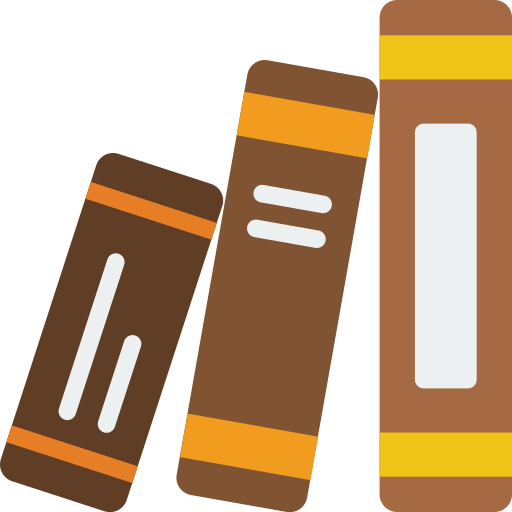
Thinking about what I should read next? Here are the best books I read in last twelve months. (2020 – 21 edition)
Like every dark cloud has a silver lining, 2020, a tough year for most of us, brought in an opportunity to pause, reflect and introspect. While the world was in lockdown, I wondered how to keep myself physically fit and mentally stimulated. I have always been passionate about learning new things so I decided to read daily. Although reading everyday has a lot of benefits such as cognitive development, mental stimulation and stress and depression alleviation etc. for me it was about learning something new, and being exposed to new ideas and new ways of thinking. In August 2020, I made a pledge to read daily. I am happy to say that in the last one year, I have not missed a single day and in that process, I have read 29 books (over ~350 hours of reading and learning). Apart from gaining a ton of insights this has also been a transformative experience.
If you have been thinking about reading more (or if you want to explore some new books), I hope few of these books will pique your interest.
Personal Transformation
- Atomic Habits by James Clear:
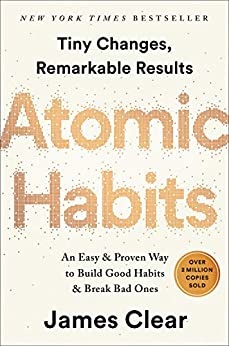
“When nothing seems to help, I go and look at a stonecutter hammering away at his rock perhaps a hundred times without as much as a crack showing in it. Yet at the hundred and first blow it will split in two, and I know it was not that blow that did it, but all that had gone before.” – Jacob Riis
This is the power of continuous improvement and marginal gains. We often do not give enough attention to marginal gains but over a long period of time the compounding effect of these marginal gains add up and become transformative.
Have you ever made a new year’s resolution and then struggled to keep it? You are not alone, as per a study, only 7% of people stuck to all of their new year resolutions in 2019, and only 19% kept some but not all of their resolutions.
Why is forming habits so hard? Perhaps there is a better way to form a habit. Last year during the pandemic, when all of us were isolated in our homes, I wanted to form two habits: read daily and exercise daily.
I thought, what better way to start daily reading than by reading a book on how to form habits. I found Atomic Habits to be transformational. It’s perhaps the most practical and easy to follow guide to create good habits and lose bad ones. The central idea of building a system for getting 1% better every day really resonated with me. The author talks about 4 laws of forming habits – make it obvious, make it attractive, make it easy, and make it satisfying. This framework was an eye opener for me. For example, one of my goals was to exercise daily. This goal was the result of a desire to be fitter and healthier. Fitness takes a long time to build and in the age of instant gratification it is easy to feel unmotivated and stop exercising. Using the framework provided by the author, I transferred my daily exercise and fitness goal into the goal of closing all three activity rings of my apple watch (move, exercise and stand). It was a simple and fun way to live a healthier life. Without this gamification I don’t think I would have stuck to my daily exercise regime.
I can’t recommend this book enough. If you want to read one book from this list please read this one.
- The 7 habits of highly effective people by Stephen R. Covey:
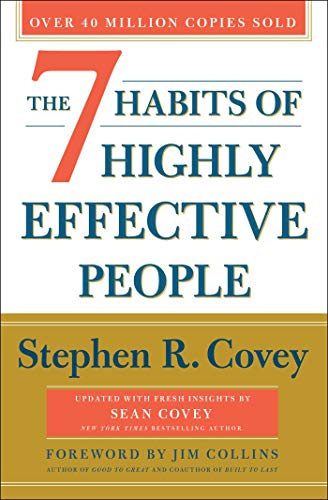
In the spirit of getting 1% better every day, I was interested in learning which areas I should get better at. Learning more about what habits differentiates highly effective people seemed to me a natural next step. I love structure and frameworks and some of the frameworks shared by the author in this book are exceptional.
The framework of defining habits as an intersection of knowledge (what and why), skill (how) and desire (want) was insightful. This framework is also applicable to personal and professional lives. We will excel at things which are at an intersection of these three areas.
The seven habits themselves – be proactive, begin with the end in mind, put first things first, think win win, seek first to understand and then to be understood, synergize, and sharpen the saw are profound, and clearly articulated.
Urgent and important framework shared by the author to prioritize first things first is very useful and has helped me tremendously.
If you are someone who is looking to become more effective, efficient and empathetic I would highly recommend this book.
- Never split the difference by Chris Voss:
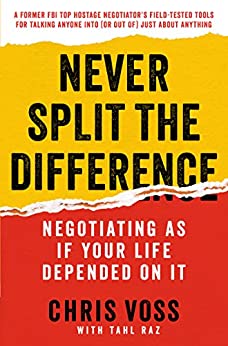
To be honest, negotiation does not come naturally to me. However I agree with the author that life is a series of negotiations we should be prepared for. Whether it is negotiating a salary, buying a home/car, renegotiating rent, or even trying to get your project approved at work place. This book outlines a framework based on emotional intelligence to have more productive and effective negotiation.
Although most of the examples in the book come from the author’s previous experience of hostage negotiation, the framework discussed in the book is applicable in our personal and professional life. I find that some of the recommendations in the book apply beyond negotiation and it could help in being more empathetic.
Interesting thing about this book is that when I was a MBA student at USC Marshall school of business I wanted to take the Negotiation class by Chris Voss. This was among highly rated and very popular classes at the school. Unfortunately the semester I wanted to enroll in this class was the semester when Chris left USC and I could never attend his class. So this book has been on my reading list ever since.
Even if you think you don’t need to learn how to negotiate, I would highly recommend reading this book.
- Think like a monk by Jay Shetty:
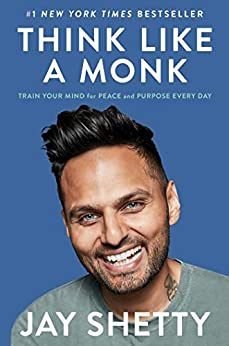
It’s not a genre I read often but mindfulness and meditation was top of my mind last year. I found this book really accessible and relatable. Author shares his experience at an ashram in India where he trained for three years to become a monk which makes the book very engaging.
The book is structured around three pillars – Let Go (identity, negativity, fear, intention), Grow (purpose, routine, the mind, ego), Give (gratitude, relationship, and service) and help in understanding a lot of important questions we face daily – how to overcome negativity, how to stop overthinking, how to use your fear, how to find your purpose, and why kindness is crucial to success?
The description of monkey mind vs monk mind is very insightful on how to frame our thinking to find peace, calm and purpose. I think the book is packed with a lot of wisdom which can help all of us in our spiritual journey towards mindfulness.
Macroeconomics
- Good Economics for Hard Times by Abhijit V. Banerjee, and Esther Duflo:
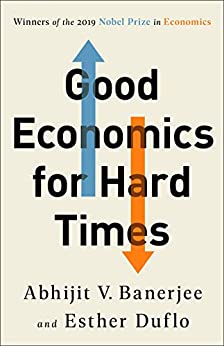
August 2020, was close to the US presidential election. It was perhaps one of the most polarizing elections of our times. A lot of social and economic issues such as immigration, global trade, climate change and racial equality were in the limelight. Myriad of opinion articles on these topics did not quench my desire to understand these topics and how government policies impact all of us. This book is brilliant in answering some of the toughest questions. I loved the fact that authors provide data from several studies to make their point. I found the use of extensive data generated by research backed methods to make a point about some of the hottest socio economic issues really compelling.
If you are someone who is interested in learning more about global issues like immigration, global trade, climate change and racial equality and how government policies impact them then I will highly recommend reading this book.
Computer Science
- Algorithms to live by by Brian Christian, and Tom Griffiths:
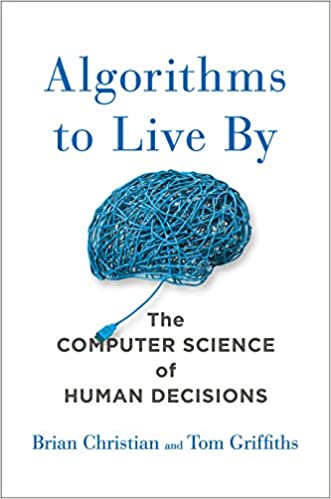
I have a soft spot for this book and it’s one of my favorite books in the list. The book explores eleven computer science algorithms that can be applied in our everyday lives to help us make better decisions. Authors explore Optimal stopping, Explore/Exploit, Sorting, Caching, Scheduling, Bayes’s rule, Overfitting, Relaxation, Randomness, Networking and Game theory in the book and explain how these algorithms from computer science can help us in what we think of as uniquely human problems.
From buying a house to finding a spouse, from finding parking spots to organizing a closet, authors do fantastic job in bringing the wisdom of computer science into strategies for daily life. As someone with a computer science background I now have a new appreciation for algorithms. Have you ever met someone who while talking about maths or calculus (or other subjects) said “what’s the point? We never use this thing in real life.”. Well after reading this book that view will change drastically. This book opens a whole new world of thinking that we may find answers to daily human problems we face in science. It’s a remarkable book which has the potential to transform how we humans make decisions in daily life.
- Designing data intensive applications by Martin Kleppmann:
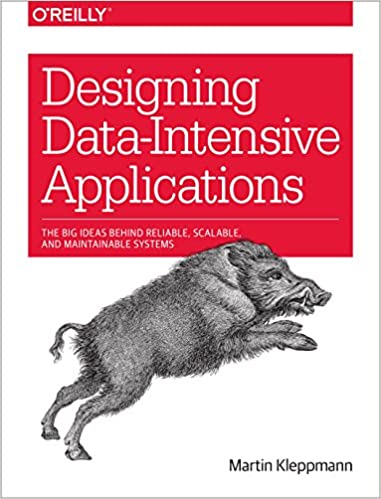
Today data is the most important asset for organizations. With rapid growth it is becoming harder to maintain scalability, reliability, availability, consistency, maintainability and efficiency of data intensive distributed systems. Author does a tremendous job in covering a diverse landscape of technologies to help readers understand intricacies in designing highly scalable and highly available applications.
If you are a software engineer, a software architect or a technical product manager and develop applications which need data intensive backend then I highly recommend reading this book. I work in core infrastructure with focus on data management and by reading this book I now have a deeper level of appreciation of what it takes to build a highly scalable, highly available and fault tolerant system.
Strategic Management
- The Innovator’s Dilemma: When New Technologies Cause Great Firms to Fail (Management of Innovation and Change) by Clayton M. Christensen
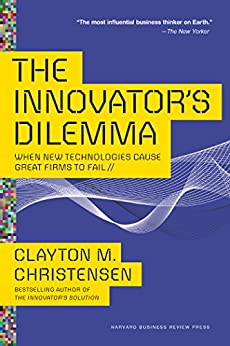
Do you remember Kodak, Blockbuster, Yahoo, Nokia, and Blackberry? All these companies were industry leaders at one point but then what happened? As per a recent McKinsey study, in 1935, the average life expectancy of an S&P 500 company was 90 years. By 2010, it was 14 years and studies show that it’s getting even shorter. Why does organic growth elude many long-standing companies, and why younger companies outperform incumbents of the industry? In this book the author demonstrates how leaders, while adhering to conventional wisdom and best practices, stifle innovation at top-performing companies.
This book provides a framework to think beyond sustainable and incremental innovation and recognize and foster disruptive innovation. The book explains how the underserved down market customer segment is often a lucrative target for disruption and it leads to innovation in new business models and technology which ends up disrupting the mainstream upmarket. This is a must read for any business leader interested in innovation.
- Measure what matters by John Doerr:
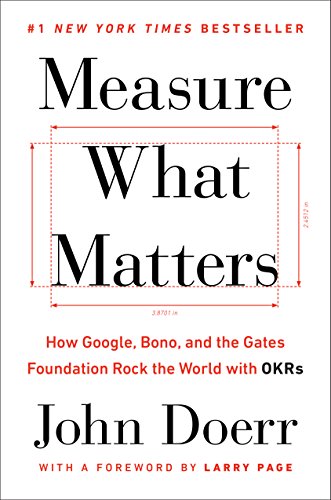
I have written a blog on OKR and KPIs so no surprise I like this book. This book does a great job at explaining how OKR and KPIs can be used as a superpower to develop focus and communicate shared goals across the company.
As a product manager I find ideas shared in this book indispensable in both personal and professional life.
The overarching idea in the book is simple yet profound. Framework shared in the book will help you stay focused and implement useful ideas.
- The five most important questions by Peter F. Drucker:
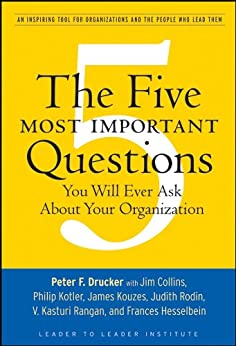
This book offers a strategic framework for self assessment and transformation. The author takes us through a set of five questions – What is our mission? Who is our customer? What does the customer value? What are our results? and What is our plan? By answering these questions leaders can better assess why they are doing what they are doing. These essential questions help organizations focus on becoming more effective and transform themselves.
- Blitzscaling by Reid Hoffman,and Chris Yeh:
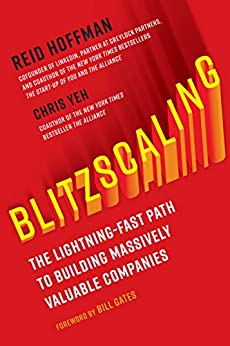
As a product person I aspire to be part of a company building the next Google, Amazon, Facebook or Airbnb. However, there are only a small percentage of startups which ultimately grow to become global giants. What differentiates these unicorns to other companies who do not make it? We live in an age of globalization and network economy. The prevalence of software means that the marginal cost of serving at large scale is very low. This means that once you have found product market fit it might be time to scale really fast and capture the market before competitors start offering similar products and services.
The book provides fascinating insights into how to scale at breakneck speed. The book covers business model innovation, strategy innovation, and management innovation required to successfully blitzscale. Whether you are starting a new company or a new product I highly recommend reading this book.
Product Management and Design:
- The design of everyday things by Donald A. Norman:
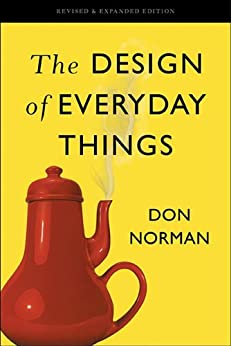
I am passionate about human centered design and I believe that design doesn’t have to be complicated, or focused solely on aesthetics. Author explains the conflicts in between engineering a product and designing a product based on human interaction. Being an engineer myself I found this section extremely interesting and illuminating. Our view of the world is often very structured and when people struggle while interacting with technology we fail to understand that human behavior is anything but predictable, repeatable and structured. Author shares a framework to guide the user effortlessly to the right action on the right control at the right time by making things visible, exploiting natural relationships that couple function and control, and making intelligent use of constraints.
Although this book is a must read for people in design, I would say that if you are an engineer, architect or product manager you should definitely read this book. This will help you develop empathy for the end users of your product and build better products.
- Inspired by Marty Cagan:
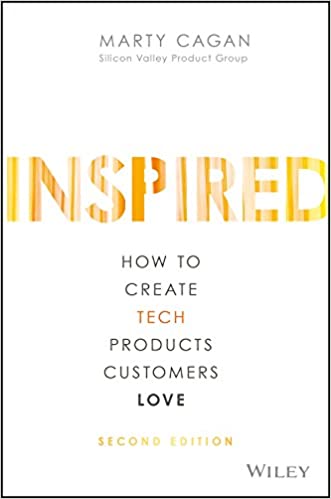
If you are an early in career product manager or an aspiring product manager then this is a must read book. Author does a fantastic job in covering intricate and complex product management topics. It explains how the most successful product companies create products in a manner which is very different from how most companies create products.
Core concepts covered in the book include – principles of strong product teams, what makes a good product manager, building the right product (vision, strategy and roadmap), product discovery, opportunity assessment, customer research, validating product market fit, communication and managing stakeholders. I love the fact that this book explains what is product management – it is not roadmap administration, or roadmap administration or project/program management. Although product managers don’t code or design, they need to be among the strongest talents in the organization. It’s a comprehensive guide for product management and one of the best books on the topic I have read so far.
- Sprint: How to Solve Big Problems and Test New Ideas in Just Five Days by Jake Knapp, John Zeratsky, and Braden Kowitz:
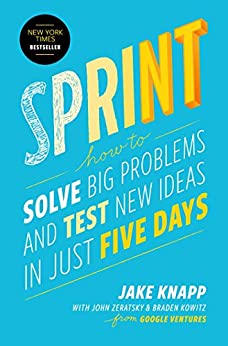
I have been part of design sprint at work in the past and this book for me was a refresher as well as concept builder. The book covers a unique five-day process for solving tough problems using design, prototyping, and testing ideas with customers. Design sprint is immensely useful in high stake situations when the stakes are high, when there’s not enough time, or when you’re just plain stuck. The book covers the design sprint over five days in detail. I found the concepts of “how we might we”, “crazy eights” and “the five act customer interview” especially useful.
I have found these ideas immensely useful even without doing the complete five day design sprint.
If you are working on a high stake problem, trying to better understand customer’s needs and find a product market fit, the design sprint is a great way to come up with ideas and validate hypotheses using prototypes.
- The lean product playbook by Dan Olsen:
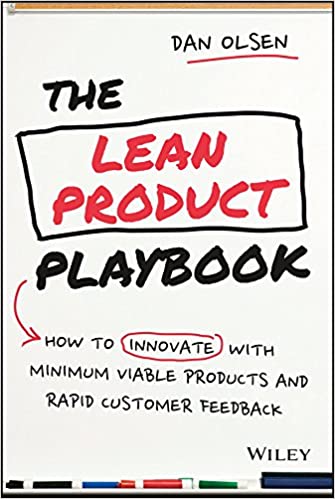
This book is a practical guide to build product customers love using lean startup principles. The book covers core product management concepts including determining target customers, identifying underserved customer needs, defining customer personas, creating a winning product strategy, deciding on Minimum Viable Product (MVP), designing MVP prototype, testing MVP with customers, and iterating rapidly to achieve product-market fit.
These concepts are illustrated by examples, diagrams and tables which explain complex concepts in an accessible way. I think it’s a must read for product management professionals.
- Hooked: How to build habit forming products by Nir Eyal:
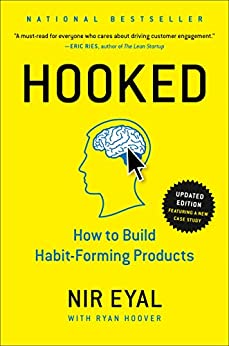
“Study revealed that what draws us to act is not the sensation we receive from the reward itself, but the need to alleviate the craving for that reward.”
As product managers we are all motivated to create products the user loves. A part of it comes from deep empathy and knowledge for the user and jobs to be done and another part comes from user psychology and behavioral economics.
The four step model (trigger, action, variable reward and investment) discussed in this book forms the foundation of many successful products which users love. This model unpacks how products subtly nudge users to come back and use the product again and again until a sticky habit is formed. It’s a bit of super power which when harnessed correctly can help improve people’s lives across the world. The book provides a clear explanation of each concept by showing examples of everyday products. I found the book extremely valuable in understanding user psychology and behaviors.
I am looking forward to continuing my reading journey next year. If you have recommendations for reading please do let me know.


One Comment
Sanjay Kam
That’s some great recommendations, I will pick few from this list!